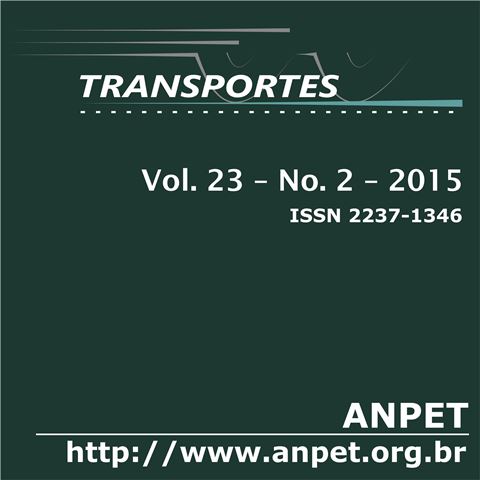.
DOI:
https://doi.org/10.14295/transportes.v23i2.856Keywords:
Guided Local Search, Crew Scheduling Problem in mass transit, Metaheuristic.Abstract
In this paper the metaheuristic Guided Local Search (GLS) is applied to solve the Crew Scheduling Problem (CSP) for public mass transport system. The CSP consists on finding a set of duties to be assigned to drivers in order that the daily service requirement be met at minimum cost. The GLS metaheuristic follows the basic principle of penalizing undesired characteristics that are present in the current solution and to append this penalization in the objective function with the aim of guiding the local search away from local minimum. As local search heuristic, it was employed Variable Neighborhood Descent technique, which explores different neighborhood structures to find a local optimum. According to a research conducted by the authors, this is a novel approach to solve the CSP. The proposed implementation was tested with data from real problems of a bus company operating in a metropolitan region of Belo Horizonte. The results are comparable with those reported in the literature, being subject to improvement, once the GLS can be exploited in different ways.Downloads
References
Adams, J., Balas, E., E Zawack, D. (1988). The Shifting Bottleneck Procedure for Job Shop Scheduling. Management Science. v. 34, n. 3, p. 391–401. doi:dx.doi.org/10.1287/mnsc. p. 34.3.391
Ahuja, R. K., Orlin, J. B., E Sharma, D. (2000). Very large-scale neighborhood search. International Transactions in Operational Research, 7(4-5), 301–317. doi:10.1111/j.1475-3995.2000.tb00201.x
Balas, E., E Vazacopoulos, A. (1998). Guided Local Search with Shifting Bottleneck for Job Shop Scheduling. Management Science, v. 44, n. 2, p. 262–275. doi:dx.doi.org/10.1287/mnsc. p. 44.2.262
Barnhart, C., Johnson, E. L., Nemhauser, G. L., Savelsbergh, M. W. P., E Vance, P. H. (1998). Column Generation for Solving Huge Integer Programs. Transportation Science, v. 23, p. 1–33.
Bouzada, C. F. (2003). Custo do transporte coletivo por ônibus. Belo Horizonte, MG: C/Arte,Desrochers, M., E Soumis, F. (1989). A column generation approach to the urban transit crew scheduling problem. Transportation Science, v. 23, n. 1, p. 1–13. doi:10.1287/trsc.23.1.1
Ernst, A. T., Jiang, H., Krishnamoorthy, M., E Sier, D. (2004). Staff scheduling and rostering: A review of applications, methods and models. European Journal of Operational Research, v. 153, n. 1, p. 3–27. doi:10.1016/S0377-2217(03)00095-X
Fischetti, M., Martello, S., E Toth, P. (1987). The fixed job schedule problem with spread-time constraints. Operations Research, v. 35, n. 6, p. 849–858. doi:10.1287/opre.35.6.849
Fores, S., Proll, L., E Wren, A. (1999). An improved ILP system for driver scheduling. In: Wilson, N. H. M. (Ed) Computer-Aided Transit Scheduling, p. 43–61. Springer. doi:10.1007/978-3-642-85970-0_3
Friberg, C., E Haase, K. (1999). An exact branch and cut algorithm for the vehicle and crew scheduling problem. In: Wilson, N. H. M. (Ed) Computer-Aided Transit Scheduling, p. 63–80. Springer. doi: 10.1007/978-3-642-85970-0_4
Li, J., E Kwan, R. S. K. (2003). A fuzzy genetic algorithm for driver scheduling. European Journal of Operational Research, v. 147, n. 2, p. 334–344. doi: 10.1016/S0377-2217(02)00564-7
Lin, S., E KERNIGHAN, B. W. (1973). An Effective Heuristic Algorithm for the Travelling-Salesman Problem. Operations Research, 1, p. 498–516,
Lourenço, H. R., Paixao, J. M. P., E Portugal, R. (2001). Multiobjective metaheuristics for the bus driver scheduling problem. Tranportation Science, v. 35, n.3, p. 331–343. doi:10.1287/trsc.35.3.331.10147
Marinho, E. H., Ochi, L. S., Drummond, L. M. A., M.J.F., S., E Silva, G. P. (2004). Busca Tabu aplicada ao problema de programacao de tripulacoes de onibus urbano. Anais do XXXVI Simposio Brasileiro de Pesquisa Operacional SBPO, p. 1471–1482.
Mladenovic, N., E Hansen, P. (1997). Variable neighborhood search. Computers and Operations Research, v. 24, p. 1097–1100. doi:10.1016/S0305-0548(97)00031-2
Reis, A. F. Da S., E Silva, G. P. (2012). Um estudo de diferentes métodos de busca e a metaheurística VNS para otimizar a escala de motoristas de ônibus urbano. Transporte em Transformação XVI - Trabalhos Vencedores do Prêmio CNT - Produção Acadêmica 201, p. 47–64.
Shen, Y., E Kwan, R. S. K. (2001). Tabu search for driver scheduling. In: S. Voss & J. R. Daduna (Eds), Computer-Aided Scheduling of Public Transport, p. 121–135. Springer. doi:10.1007/978-3-642-56423-9_7
Silva, G. P., E Cunha, C. B. (2010). Uso da Técnica de Busca em Vizinhança de Grande Porte para a Programação da Escala de Motoristas de Ônibus Urbano. Transportes, v. 18, p. 64–75. doi:10.4237/transportes.v18i2.422
Silva, G. P., E Reis, A. F. Da S. (2014). A study of different metaheuristics to solve the urban transit crew scheduling problem. Journal of Transport Literature, v. 8, n. 4, p. 227–251. doi:/10.1590/2238-1031.jtl.v8n4a9
Smith, B. M., E Wren, A. (1988). A Bus Crew Scheduling System Using a Set Covering Formulation. Transportation Research, v. 22A, p. 97–108. doi:10.1016/0191-2607(88)90022-2
Souza, M. J. F., Cardoso, L. X. T., Silva, G. P., Rodrigues, M. M. S., E Mapa, S. M. S. (2004). Metaheurísticas aplicadas ao Problema de Programação de Tripulações no sistema de transporte público. Tendências em Matemática Aplicada e Computacional, v. 5, n. 12, p. 357–368.
Talbi, E. (2009). Metaheuristics: From Design to Implementation. (First Edit.). John Wiley and Sons. doi:10.1002/9780470496916.fmatter
Tsang, E. P. K., E Voudouris, C. (1997). Fast Local Search and Guided Local Search and Their Application to British Telecom ’ s Workforce Scheduling Problem. Operations Research Letters, v. 20, n. 3, p. 119–127. doi:10.1016/S0167-6377(96)00042-9
Voudouris, C. (1997). Guided Local Search for Combinatorial Optimisation Problems. PhD. Thesis, University of Essex - United Kingdom, Department of Computer Science.
Voudouris, C., E Tsang, E. P. K. (1999) Guided Local Search and its application to the Travelling Salesman Problem. European Journal of Operational Research, v. 113, n. 2, p. 469–499. doi: 10.1016/S0377-2217(98)00099-X
Voudouris, C., E Tsang, E. P. K. (2003). Guided Local Search. Handbook of Metaheuristics, v. 57, p. 185–218.
Downloads
Published
How to Cite
Issue
Section
License
Authors who submit papers for publication by TRANSPORTES agree to the following terms:
- The authors retain the copyright and grant Transportes the right of first publication of the manuscript, without any financial charge, and waive any other remuneration for its publication by ANPET.
- Upon publication by Transportes, the manuscript is automatically licensed under the Creative Commons License CC BY 4.0 license. This license permits the work to be shared with proper attribution to the authors and its original publication in this journal, and to be adapted for non-commercial purposes, provided appropriate credit is given and any derivative works are distributed under the same terms.
- Authors are authorized to enter into additional separate contracts for the non-exclusive distribution of the version of the manuscript published in this journal (e.g., publishing in an institutional repository or as a book chapter), with recognition of the initial publication in this journal, provided that such a contract does not imply an endorsement of the content of the manuscript or the new medium by ANPET.
- Authors are permitted and encouraged to publish and distribute their work online (e.g., in institutional repositories or on their personal websites) after the editorial process is complete. As Transportes provides open access to all published issues, authors are encouraged to use links to the DOI of their article in these cases.
- Authors guarantee that they have obtained the necessary authorization from their employers for the transfer of rights under this agreement, if these employers hold any copyright over the manuscript. Additionally, authors assume all responsibility for any copyright infringements by these employers, releasing ANPET and Transportes from any responsibility in this regard.
- Authors assume full responsibility for the content of the manuscript, including the necessary and appropriate authorizations for the disclosure of collected data and obtained results, releasing ANPET and Transportes from any responsibility in this regard.









